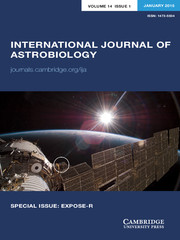Article contents
Does extraterrestrial life have intrinsic value? An exploration in responsibility ethics
Published online by Cambridge University Press: 27 February 2018
Abstract
If space explorers discover a biosphere supporting life on an off-Earth body, should they treat that life as possessing intrinsic value? This is an ethical quandary leading to a further question: how do we ground a universal moral norm to which the astroethicist can appeal? This article closely analyses various forms of responsibility ethics and finds them weak because they commit the naturalistic fallacy – that is, they ask nature to define the good. The good, however, is self-defining and not derivable from nature. Even so, a revised responsibility ethic could ground its universal norms on the fact that life and only life can experience and appreciate the good. Conclusion: living creatures possess intrinsic value both on Earth and elsewhere in the Universe.
Keywords
- Type
- Research Article
- Information
- Copyright
- Copyright © Cambridge University Press 2018
References
A correction has been issued for this article:
- 8
- Cited by
Linked content
Please note a has been issued for this article.


